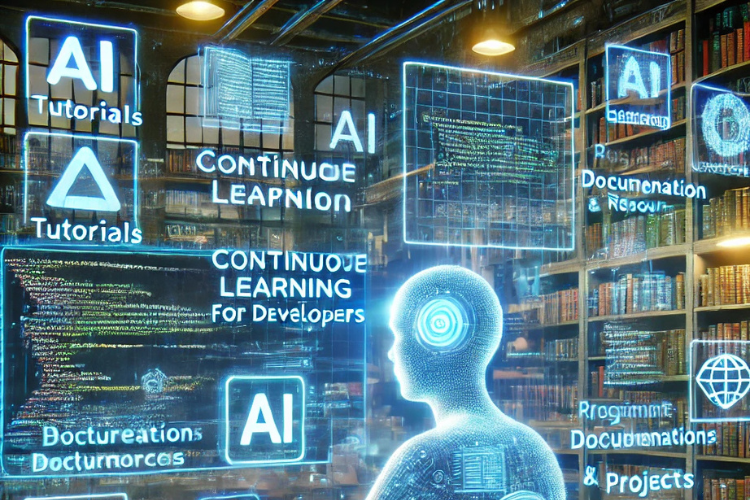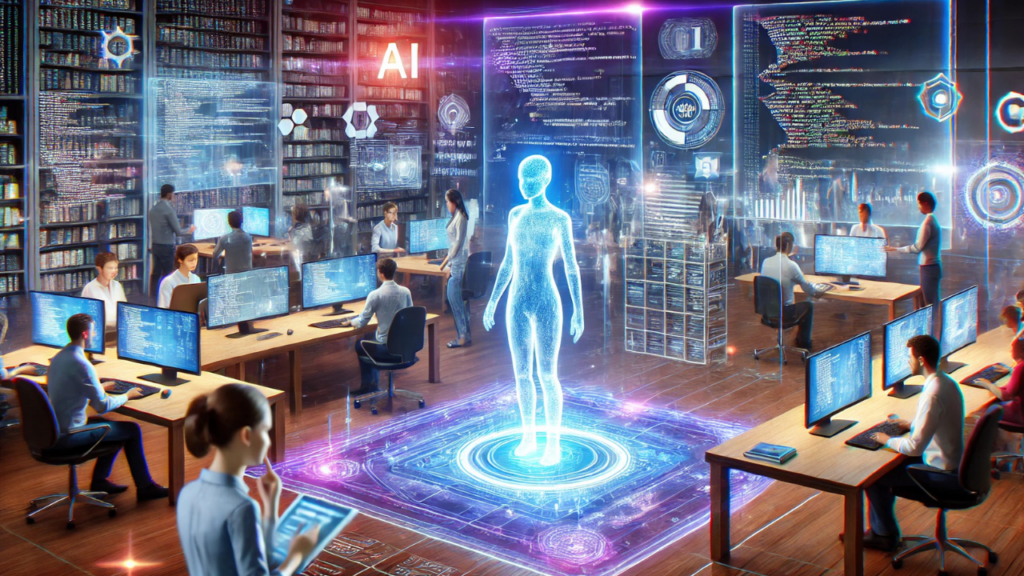Introduction
AI is transforming industries across the globe, and software development is no exception. But despite the buzz around artificial intelligence, one thing is clear: AI is here to enhance, not replace, developers. This powerful technology is a tool that can boost developer capabilities, automate mundane tasks, and ultimately drive more creative and efficient solutions. The future of software development is tied to the successful integration of AI, and in this post, we’ll explore how AI will shape the future for developers in the coming years.
1. AI as an Enhancement, Not a Replacement
AI’s primary role in software development is not to replace developers, but to augment their abilities. Think of AI as an extension of a developer’s skills. It automates repetitive, time-consuming tasks, which allows developers to focus on what really matters—problem-solving and creativity.
For example, developers spend a lot of time writing boilerplate code. AI tools can now generate this code, saving hours of work. This means developers can spend their time designing systems, architecting solutions, and working on more complex aspects of the software. Rather than a threat, AI serves as a valuable tool in a developer’s toolkit, enabling them to accomplish more in less time.
As AI evolves, it will only become more integrated into the development workflow. Instead of spending time on manual tasks, developers can focus on innovating and developing new features that enhance the user experience.
2. Boosting Productivity and Efficiency
The role AI plays in boosting productivity is already evident in several areas of software development. AI-powered tools like code autocompleters and intelligent debuggers significantly speed up the development process. These tools not only save time but also reduce the chance of human error, which is crucial when building complex systems.
Code autocompleters predict and suggest code as developers type, eliminating the need to look up syntax and reducing the chance of typos. Similarly, intelligent debuggers can detect issues in real time, offering suggestions for fixing them. This allows developers to spend less time hunting down errors and more time writing high-quality code.
By automating these routine tasks, AI frees developers to work on more creative aspects of their jobs, such as designing software architecture and developing features. The result is faster turnaround times and better-quality software.
3. Facilitating Continuous Learning
In the fast-paced tech world, staying updated with the latest tools and technologies is essential. AI is helping developers learn continuously by recommending relevant tutorials, documentation, and resources tailored to their needs. With AI-powered platforms, developers can quickly get up to speed on new programming languages, frameworks, and development methodologies.

AI also personalizes the learning experience by analyzing a developer’s skill level and learning preferences. It suggests materials that are aligned with their current projects, helping them learn more efficiently and effectively. This means developers can remain at the forefront of technology without spending hours sifting through irrelevant content.
The tech industry is always evolving, and AI is making it easier for developers to keep pace with these changes. A developer who leverages AI as a learning tool will be able to quickly adapt to new technologies, keeping their skills sharp and their projects cutting-edge.
4. Enhancing Collaboration and Communication
Effective collaboration and communication are key components of any successful software development project. AI is revolutionizing how developers work together by streamlining communication and improving team workflows.
AI-powered project management tools help teams track tasks, milestones, and deadlines in real time. These tools provide intelligent insights into project progress, automatically generating reports, and flagging potential issues before they become problems. This reduces the time developers spend on administrative tasks and ensures that everyone stays on the same page.
Moreover, AI tools that automate meeting summaries and action points make it easier for teams to follow up on decisions and assignments. These AI-powered solutions reduce the risk of miscommunication, ensuring that everyone involved is aligned on project goals. The result is smoother collaboration and more efficient project execution.
AI doesn’t just help individual developers; it enhances the whole team’s ability to work together seamlessly. From task delegation to meeting notes, AI optimizes every part of the communication process.
5. Unlocking New Possibilities for Innovation
The future of software development is limitless, especially when developers embrace the possibilities that AI offers. AI isn’t just about automating tasks or improving productivity; it’s also about unlocking new opportunities for innovation. As AI evolves, it will continue to push the boundaries of what’s possible in software development.
For example, AI can help developers build smarter applications that can learn from user behavior and adapt in real time. This opens the door to developing more personalized, dynamic software solutions. With AI’s assistance, developers can focus on solving complex problems, such as building predictive algorithms or creating AI-driven features, which were once considered too challenging to implement.
Rather than seeing AI as a threat to their jobs, developers should embrace it as a catalyst for growth. Those who leverage AI tools and integrate them into their workflows will be better equipped to tackle the challenges of tomorrow and stay ahead in the competitive tech industry.
Conclusion
AI is changing the software development landscape. Rather than replacing developers, AI is empowering them to be more efficient, productive, and creative. By automating repetitive tasks, boosting collaboration, and offering continuous learning opportunities, AI is becoming an indispensable part of the developer’s toolkit.
The developers who embrace AI will be the ones who lead the way in shaping the future of technology. AI offers immense potential, and those who harness it will unlock new possibilities for innovation and growth. As highlighted by platforms like StartupHakk, staying informed about AI trends and integrating them into workflows is key to driving success in the ever-evolving tech industry.




